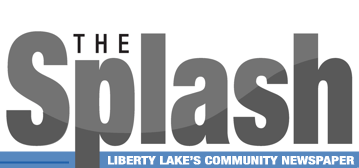 |
Cancer’s impact felt by many in community
7/18/2012 10:53:57 AM
From Staff Reports
For the past few issues, The Splash solicited submissions from readers about how cancer has intersected the lives of Liberty Lake residents. Following are the stories we received in honor of those whose lives have been touched by cancer.
When faced with my husband having a terminal brain tumor and given three to 11 months to live, what is most important rises to the surface:
• First, our relationship is like we were just married, but with the depth and maturity of having been married 29 years; it is so very bitter sweet.
• Second, the love and care of this great community. I did not realize how many wonderful friends I have, how many people have reached out to us in sincere acts of love.
• Third, the amazing love of God who draws near and instills a peace that surpasses understanding. I have peace in my soul regardless of the outcome. At the same time, as a mortal human being, I am extremely sad, yet he is there to comfort, and he sends others my way to help me through this time. Advertisement

- Submitted by Nancy Brubaker
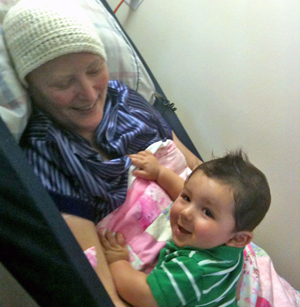
Submitted photo
Cruz Salzwedel with ‘Grandma Laurie'
|
This past February, my husband lost his stepmother to a long, horrific battle with breast cancer.
In the last few months of her life, we traveled to the Lewiston/Clarkston Valley almost every weekend to spend as much precious time with her as possible, as we knew there was not much time left. Also, we have a 17-month-old son we desperately wanted to fill with imprinted sights and smells so he would remember something even if so small about the grandma he would never grow up to know.
For Valentine's Day, after what would be our last and final visit with her, I wrote my husband a letter. It describes perfectly the profound impact her cancer - and ultimate death - made on me:
Last Sunday as we were driving up the grade, on our way home from a difficult weekend, I grabbed your hand. You let me. As long as I wanted. The only time I let go was to wipe my tears.
Watching your dad love his wife - stroke her hair, administer her medication, reassure her things will be alright, tell her she's beautiful, sit by her side, sleep on the floor next to her bed, pick out her coffin and then do it all over again - will be a beautiful memory for me. One that will remind me to be patient, kind, gentle and encouraging. One that will remind me that while I sure love you a lot, I can always love you better.
We are guaranteed that life is never certain, so while we still get to live out our love story, I am no longer going to take one minute for granted.
I'm writing this note to let you know that if years down the road you are ever sick, I'll be your Bob. I will stroke your hair, administer your medication and reassure you things will be OK. And I know you would do the same for me. That is our love.
- Submitted by Ashley Salzwedel
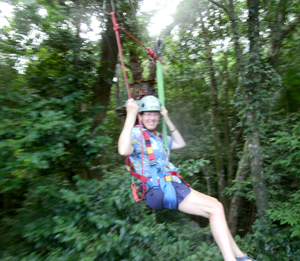
Submitted photo
Susie Leonard Weller rides a zip line through the Daintree Rain Forest
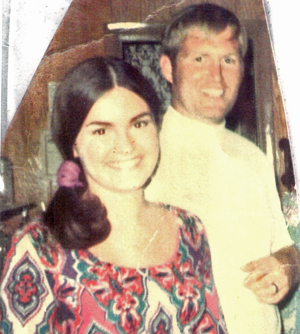
Submitted photo
Susie and Burke Horner in 1969
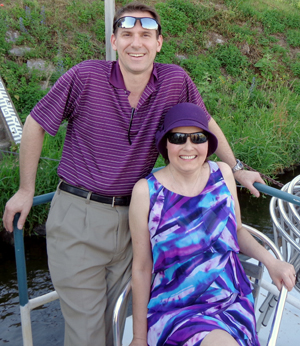
Submitted photo
For Teresa Seely and her husband, Allen, cancer has become intertwined with their personal story since a 2000 diagnosis.
|
To celebrate my five-year milestone of becoming cancer-free, my husband, Mark, and I traveled to Australia and New Zealand. One of the gifts of a life-threatening illness is the reminder to live fully - no matter what. I'm thankful for the opportunity to cross off several items from my bucket list - swimming with the dolphins, riding a camel at sunrise at the base of Uluru and swinging on a zip line through the Daintree Rain Forrest.
Frankly, it's taken several years of feeling cracked open to reclaim a deeper acceptance of all "that is." At first, I felt overwhelmed by anguish as I tried to cope with the permanent side effects resulting from my cancer treatments. Despite my best efforts, I felt powerless to overcome my grief through willpower, knowledge or my current set of skills. Since then, I've learned to process each loop of feelings and their underlying messages. As a result, I've shifted from surviving to expanding my capacity for thriving.
Currently, I'm writing an eBook and giving a workshop on Aug. 19 in downtown Spokane called, "From Grieving to Thriving." For more details, visit www.grievinginplainsight.com.
- Submitted by Susie Leonard Weller
How do loved ones deal with the immediate shock of learning that one of them has been diagnosed with terminal cancer? Since it was my wife of 41 years, it hit me and my children - and all of her dear friends - like a thunderbolt.
What does one do to make it easier for the person with whom you spent nearly all your life? In our case, my son, who lived in Idaho, found us a home in Liberty Lake, which we immediately bought, sight unseen, to be closer to him, his wife and our grandchildren, before she passed. Their compassion, including that of our two daughters and their families, and a beautiful, peaceful community, helped her move on.
We all will pass some day, and maybe some day there will be a cure for cancer. But I continue knowing that the quietude and support of friends in this community keep me going! Liberty Lake has been a blessing!
- Submitted by Burke Horner
My reason to Relay
By Teresa Seely
Splash Guest Column
In April 2000, I was living in a small town in Idaho. I was 32 years old, married with two children, ages 6 and 5, when I began having severe headaches. This went on for about two weeks. It felt like a sinus infection headache, but the pain was not controlled by over-the-counter pain meds. I was given a course of antibiotics to treat a possible sinus infection, but the pain did not subside. I was also experiencing chronic fatigue and bouts of forgetfulness, which I attributed to my ultra-busy schedule.
Being a full-time housewife/mother/personal accountant for my husband's business and volunteering for three charitable organizations could surely account for the fatigue and forgetfulness, but the headache was another matter. I decided, having absolutely no medical training, that I had a sinus blockage. I was scheduled for an MRI on April 7, 2000, which I was sure would show just that.
I was shocked and confused when I saw the MRI scan. It was not a sinus blockage. It was a tangerine-sized tumor in the left frontal lobe of my brain. My surgeon was able to get 95 percent of the tumor out, which definitely improved my chances of responding to treatment. After a full course of radiation, I began chemotherapy.
After the first round of chemo, I had another MRI which revealed that my tumor had grown significantly, and I had three new tumors as well. My doctor had shown me a survival chart for the various stages of astrocytoma (a type of brain cancer). While the first three stages showed significant survival improvement as time went on, the fourth stage, which is what I had, showed no signs of improved outcome. Commonly called glioblastoma multiforme - or GBM for short - the survival rate for that type of cancer was 2 percent, and survival time did nothing to improve that.
However, in 2001, I was cancer free. It was an absolute miracle that I survived this cancer, and I owe full credit to God, who used a combination of my doctor's incredible host of knowledge and my stubborn unwillingness to let this disease rob me of my perceived right to be a wife to my husband and to raise my children.
I wish that was the end of my story. That would be a pretty happy ending. Sadly, there are a couple more chapters. You see, during my second round of chemotherapy to treat the brain cancer, my doctor used a far more aggressive form of chemo than the previous one. He warned me the side effects from this type of chemotherapy could be worse than the disease itself and could even cause other cancers.
I had gone from 2001 to 2008 cancer free, or so I thought, but in February 2008, after going five months with blood level issues, my doctor decided to do a bone marrow biopsy, which revealed I had leukemia (AML).
I once again had to sit my children down and tell them that, "Mommy has cancer." This time, they were in eighth and ninth grade and had a much clearer picture of what that meant. This time, it meant four months in the hospital with very brief visits home between rounds of chemo, followed by a little over four months spent in Seattle preparing for and receiving my bone marrow transplantation at the Seattle Cancer Care Alliance, more commonly known as the "Hutch." After checking my siblings and other relatives with no luck, they found a 10-out-of-10 match for me - an unrelated donor who resides in Germany.
The transplantation was successful, and by 2010 I felt like I was once again at the top of my game. I competed in several charity races, including the Susan G Komen Race for the Cure, Joggin' for the Noggin' and a half marathon for the Leukemia and Lymphoma Foundation. That year, I also had my best time ever in Bloomsday and hiked to the top of St. Peter's Basilica in Italy. I felt like I was finally getting my strength and momentum back.
That is, until the fall of 2010, when I began to experience breathing problems and a host of other strange symptoms. My November 2010 checkup at the "Hutch" in Seattle revealed I had chronic Graft Versus Host Disease, or GVHD. This disease acts like an autoimmune disorder in that the immune system is attacking the body. It can be fatal, but so far that has not been the case for me. At one point I was on oxygen, and I am still taking 13 different medications to treat the lungs and other maladies related to GVHD. Thankfully, I am recovering and have high hopes for a better tomorrow.
These are hopes that not everyone has, so my reason for participating in this event is that I share the same mission as the American Cancer Society, which is a cure for all cancers so that we can all "celebrate more birthdays."
Teresa Seely lives in Liberty Lake and will captain a team called "Cancer Survivors and Caregivers" at Friday's Liberty Lake Relay For Life.
|
 |
